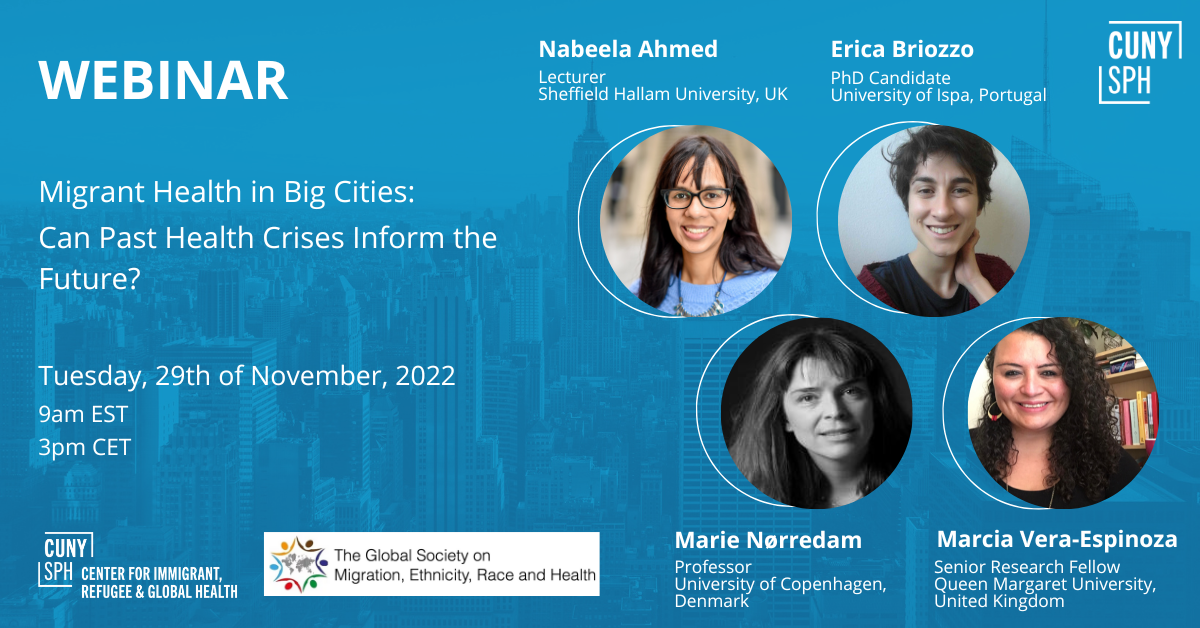Recent studies, including a systematic review done by the Center for Immigrant, Refugee, and Global Health (CIRGH) in 2022, highlight the disproportionate impact of COVID-19 –and other public health crises– on migrant populations, particularly in large urban settings. This webinar brings together researchers from a variety of institutions to discuss what has been learned about migrant health policy in urban areas facing public health crises and how these lessons can inform future policy and action. Speakers will highlight the impact of exclusion, promising strategies for integration and social connection, and the role of civil society in serving vulnerable migrant groups, among other themes.
The webinar is meant to stimulate discussion and exchange of ideas. It will include short presentations and interaction with participants.
The webinar will be opened by Dr. Bernadette Kumar, President of the Global Society on Migration, Ethnicity, Race and Health, Co-Chair of the Lancet Migration, and Associate Professor for Global Health at the Institute for Health and Society at the University of Oslo. It will be moderated by Dr. Kathleen Cravero, Distinguished Lecturer at the City University Graduate School of Public Health and Health Policy (CUNY SPH) and director of CUNY’s Center for Immigrant, Refugee and Global Health.
Speakers
Dr. Nabeela Ahmed is a human geographer at Sheffield Hallam University in the United Kingdom. She works at the intersections of urban studies, governance and precarity in post-colonial contexts. Her research focuses on questions of precarity (in terms of gender and race as well as class), citizenship and state welfare in urban contexts. She is currently looking at how these questions evolve in the digital age, primarily in South Asia.
Dr. Ahmed has worked on migrant rights and access to infrastructure in South Asian cities for the past decade in both academic and practitioner capacities. Currently, Nabeela is Lecturer in the Department of the Natural and Built Environment at Sheffield Hallam University and researching gender rights among labor migrants and access to digital technologies in Delhi, India.
Dr. Ahmed will highlight the challenges faced by migrants moving between large urban areas and/or from urban to rural areas during the COVID-19 pandemic in India.
Erica Briozzo is a PhD candidate at the Applied Psychology Research Center Capabilities and Inclusion (APPsyCI) at the University of Ispa in Lisbon, Portugal. Her research focuses on the integration of refugees in Portugal and on migrant detention (in Italy and Portugal). She uses multi-qualitative, participatory methods in her PhD research to investigate experiences of people seeking sanctuary in Lisbon and of migrants in detention centers across Portugal.
Ms. Briozzo is actively involved with the refugee-serving community-based organization Fórum Refúgio. She is particularly interested in the role of community-based organizations and civil society organizations in promoting inclusion and settlement. In 2019, she collaborated on action-research in a self-reliant migrant neighborhood in Portugal.
Ms. Briozzo will discuss how civil society and refugee-led organizations (RCOs) addressed the COVID-19 pandemic in the urban area of Lisbon.
Dr Marcia Vera-Espinoza is a Senior Research Fellow at the Institute for Global Health and Development (IGHD), Queen Margaret University in the United Kingdom. Dr. Vera-Espinoza leads the Psychosocial Wellbeing, Integration and Protection Research Cluster at the IGHD. She is also a researcher at CAMINAR (Comparative Analysis on International Migration and Displacement in the Americas) and principal investigator of a project entitled ‘New Scots Integration: A Pathway to Social and Economic Inclusion’. Her research interests include the study of migration and refugee dynamics, experiences of inclusion, and migration governance in Latin America, and beyond. She is also conducting research on the impacts of COVID-19 on migrant and refugee populations across seven countries in Latin America as part of the CAMINAR research group.
Dr. Vera-Espinoza will discuss her multi-country research on migration integration strategies in Latin America.
Dr. Marie Louise Nørredam is the director of the Danish Research Centre for Migration, Ethnicity, and Health and professor for Migration, Ethnicity, and Health at the University of Copenhagen in Denmark. In addition, she works as an infectious disease specialist with the section for Immigrant Medicine at the University Hospital Hvidovre in Copenhagen, Denmark. Her main scientific interest lies within the field of health equity, migration, and access to health services among migrant populations, particularly on the impact of ethnicity and migration on health conditions and access to health care, vulnerable migrant groups, mental health, and chronic diseases. Previous research projects focused on refugee children’s health, mortality patterns among migrants in Denmark, undocumented migrants’ health and access to care in Copenhagen, and the use of mental health and healthcare services among migrant populations in Europe and the EU.
Dr. Nørredam will discuss strategies in place in Copenhagen to increase migrant access to health services.


